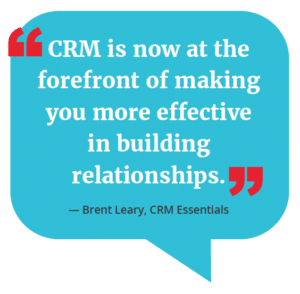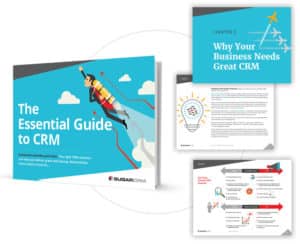Why Your Business Needs Great CRM
With more powerful and advanced technology continuously emerging, standing out in the eye of the customer has become a unique challenge these days. Great technology alone doesn’t set you apart anymore; consumers and business buyers alike have gotten more buying power today than ever before. Thanks to digital disruptors, such as Amazon and Netflix, buyers expect you to know them, automatically suggesting the next show to watch or next purchase to consider barely after completing the last. Customers have gotten used to this type of AI-driven technology, and have become used to high-convenience service technology – regardless of whether you’re selling books, enterprise software, or farm equipment.
Customers today also expect seamless transactions across devices, and 24/7 access on-the-go to products and services. What does that mean for businesses? You need to provide more than you have before. More what? More everything. But here’s the key:
Quality over quantity.

Better accessibility and more advanced features are one thing for customers. However, the one aspect that influences your customers’ buying experience more than anything is their perception of your business. It’s no longer just enough to provide the best product or service, because many prospects won’t ever become customers if they’re turned off by the experience of getting to know you. You need to deliver an exceptional first impression, and keep that level of quality consistent at every stage and touch point with the customer. Rebecca Wetteman, VP of Research at Nucleus Research, even says:
“It’s less important that you have a 360-degree view of the customer and more important that the customer has a 360-degree view of you,” […] “Whether they touch sales, marketing, or service, customers need to get the same answer, the same tone, the same interaction.”

CRM was supposed to deliver those types of sparkling results, but the first few generations of CRM technology fell short. They are what we now call Legacy CRM. Blame it on siloed data, convoluted processes, ineffective tools, or a status-quo culture – legacy CRM systems won’t deliver that modern, customer-centric approach that’s so important these days anymore. Some studies peg CRM failure rates at 60% or higher, and anecdotally, we know that many users simply don’t like their CRM systems, because the technology is too difficult to use or doesn’t help them do their jobs better.
The Effects of a Complicated CRM
When a business tries to go to battle with an underperforming CRM system, the results can be devastating. “More often than not, employees in one department don’t even know the employees in other departments, let alone use data that spans the organization,” wrote customer experience futurist Blake Morgan in Harvard Business Review. “This often results in wildly inconsistent customer experiences that make companies look disconnected and unfocused.”
McKinsey reports that less than 40% of companies say they are even moderately effective at using digital sales tools and capabilities. That speaks not just to the technology, but to the culture as well, as it may signal a lack of commitment to provide the training and support needed to master these tools.
Going From ‘Good’ to Great CRM
With increased competition and more discerning customers the pressure is on businesses to get more out of their CRM system – and quickly. CRM technology has evolved to the point where it’s delivering clear value to the top line, in the form of increased revenue, and the bottom line, stemming from increased productivity and more efficient workflows. And that translates to better return on investment (ROI).
Nucleus Research found that companies investing in CRM increased average returns by 1.5 times between 2011 and 2014, from $5.60 to $8.71 in returns per dollar spent, and that trend has continued. And, in a 2017 survey by CITE Research, sales professionals said CRM was the most used and the most valuable tool in their technology arsenal.
Wettemann says she’s seen a distinct change over the past couple of years in CRM’s effectiveness at driving greater productivity across sales, marketing, and service functions. “We see that playing out in two ways,” she says. “It’s adding to the top line, by making sales more productive, and it’s cutting the bottom line, by automating more tasks and enabling companies to do more with fewer resources.”
Let’s take a closer look at the specific benefits that a great CRM yields:
Top-Line Benefits
After a business has implemented a new or updated CRM, it’s important to look at the ROI it yields as soon as it’s being used. Most businesses can connect CRM use to direct revenue growth, as their lead scoring and lead nurturing tools and tactics improve by use of their CRM system. This, in turn, affects the quality of prospects that marketing routes over to sales and improves overall lead quality. Additionally, automated workflows and built-in analytics provide precise insight and action prompts, helping to boost conversion rates by providing the right touch at the right time.

Hilco Valuation Services, an industry-leading asset valuation company, noticed that CRM can also improve repeat business by providing sales, marketing, and customer service teams with a more comprehensive customer view that helps them create and execute an end-to-end engagement strategy. This has helped Hilco grow its renewal business by 15% to 20% per year without bringing on additional resources, according to Jim Glickman, Chief Marketing Officer at Hilco.
For Brent Leary, Co-Founder and Partner of CRM Essentials, a CRM consultancy, the findings were similar:
“CRM is now at the forefront of making you more effective in building relationships. […] The ability to use information and insights should help you to get the attention and keep the attention of people you are trying to do business with, based on having a better understanding of what they are interested in and what their challenges are, and having those insights in real time.”
Bottom-Line Benefits
As businesses get their CRM up to speed, they can see how advances in workflow automation and the ability to integrate multiple data sources can have a significant impact on the CRM’s ability to improve collaboration and productivity – instead of inhibiting it, as past iterations were known for.
“A system that automates data collection and analysis allows you to spend less time doing things like data input, data upkeep, and searching for information,” says Leary.
Here are a few specific business areas where bottom-line efficiencies can be found:
- Contact center agents can resolve issues with higher satisfaction in less time, with the help of advanced workflow capabilities that provide intelligence and context for each customer interaction.
- For marketers, automated campaign management and lead scoring can reduce manual processes while improving performance.
- IT and administrators benefit from simpler, effective workflow automation. With more advanced visual design tools, developers build more inclusive workflows that require less maintenance. Automation of key associated tasks can ensure that proper pre- and post-sale activities, such as onboarding, are completed quickly to optimize the customer experience.
- Finance teams can use CRM to track and manage payment processes, for example, by tracking against date fields and flagging an account when a payment is missed.
These are just some of the benefits you can enjoy from great, modern CRM. Over the long run, many benefits will multiply themselves, adding up to an even higher ROI of your CRM.
Get step-by-steps tips on evaluation, what to avoid, and getting started with great CRM in our new guide:
 Download The Essential Guide to CRM
Download The Essential Guide to CRM


